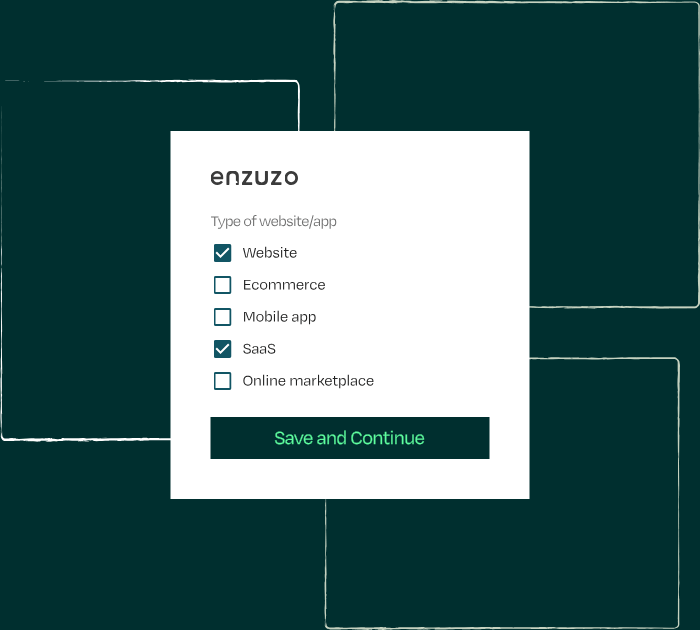How our privacy policy generator works
Follow these simple step-by-step instructions to generate a custom privacy policy for your business.
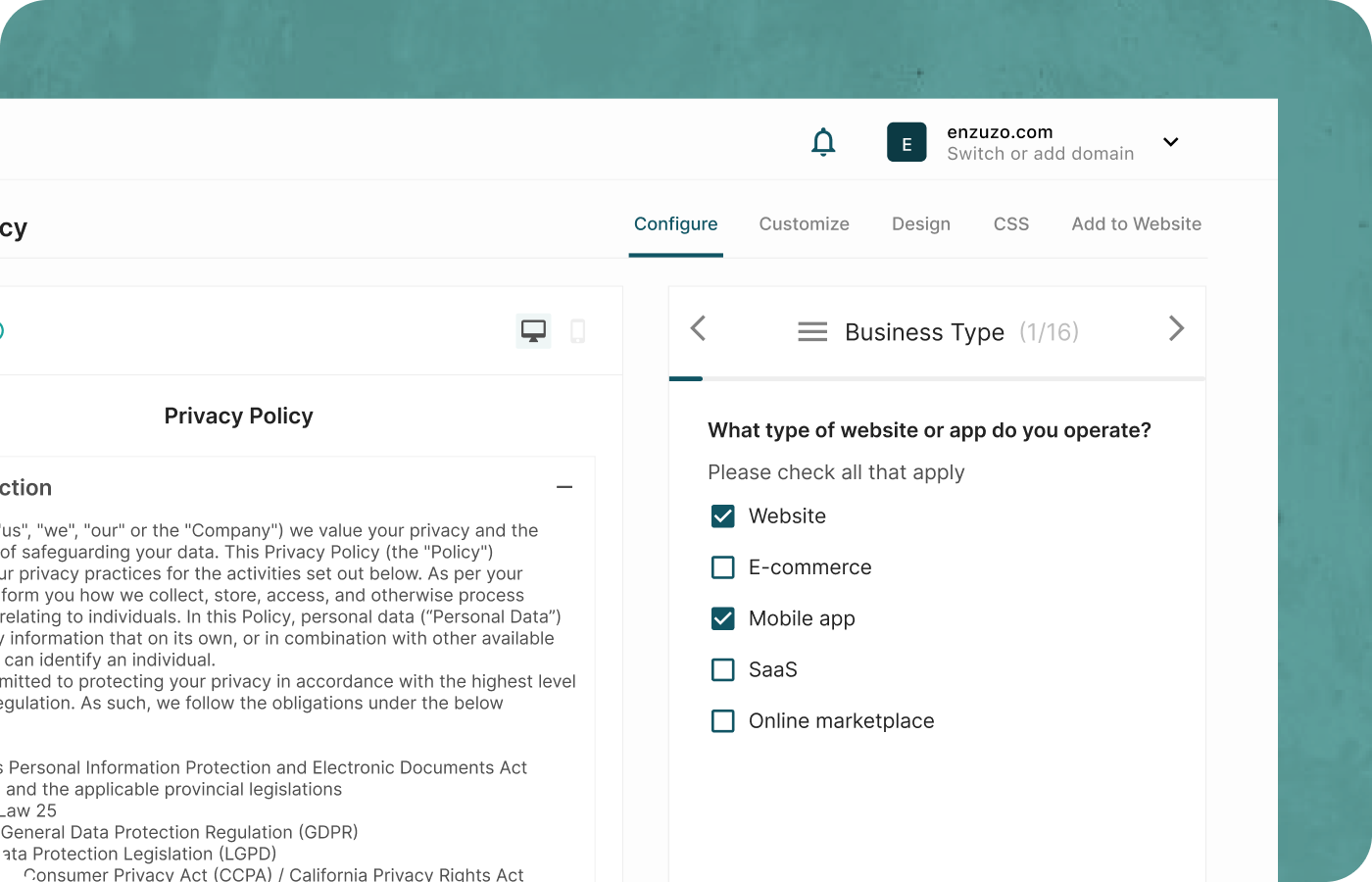
Step 1: Tell us about your business
Fill out a few details about what your business does, how it captures personal information, and where it’s located.
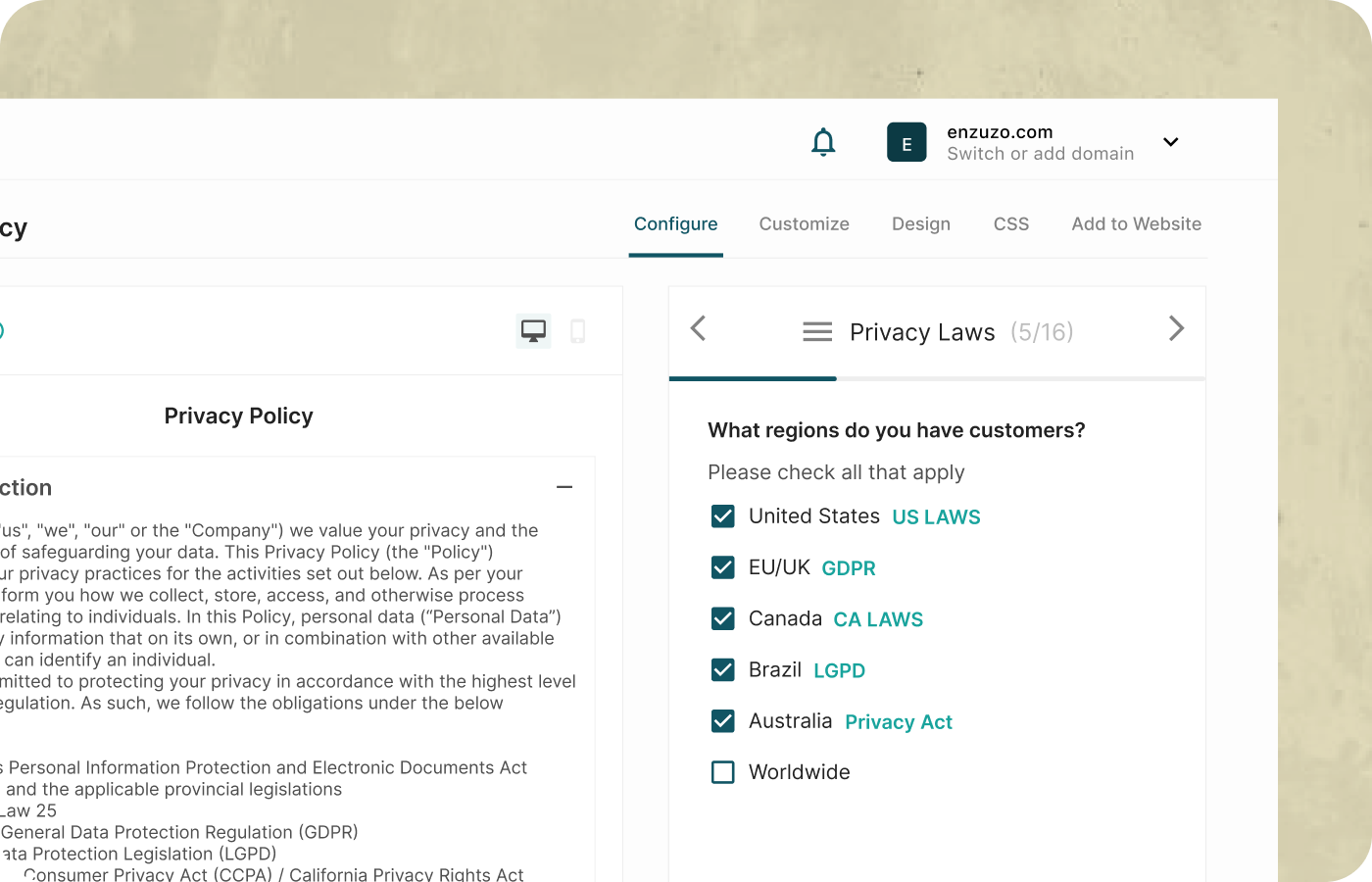
Step 2: Add additional information
Go deeper by specifying where your customers are located and which countries you service. This determines the privacy laws you’re impacted by.
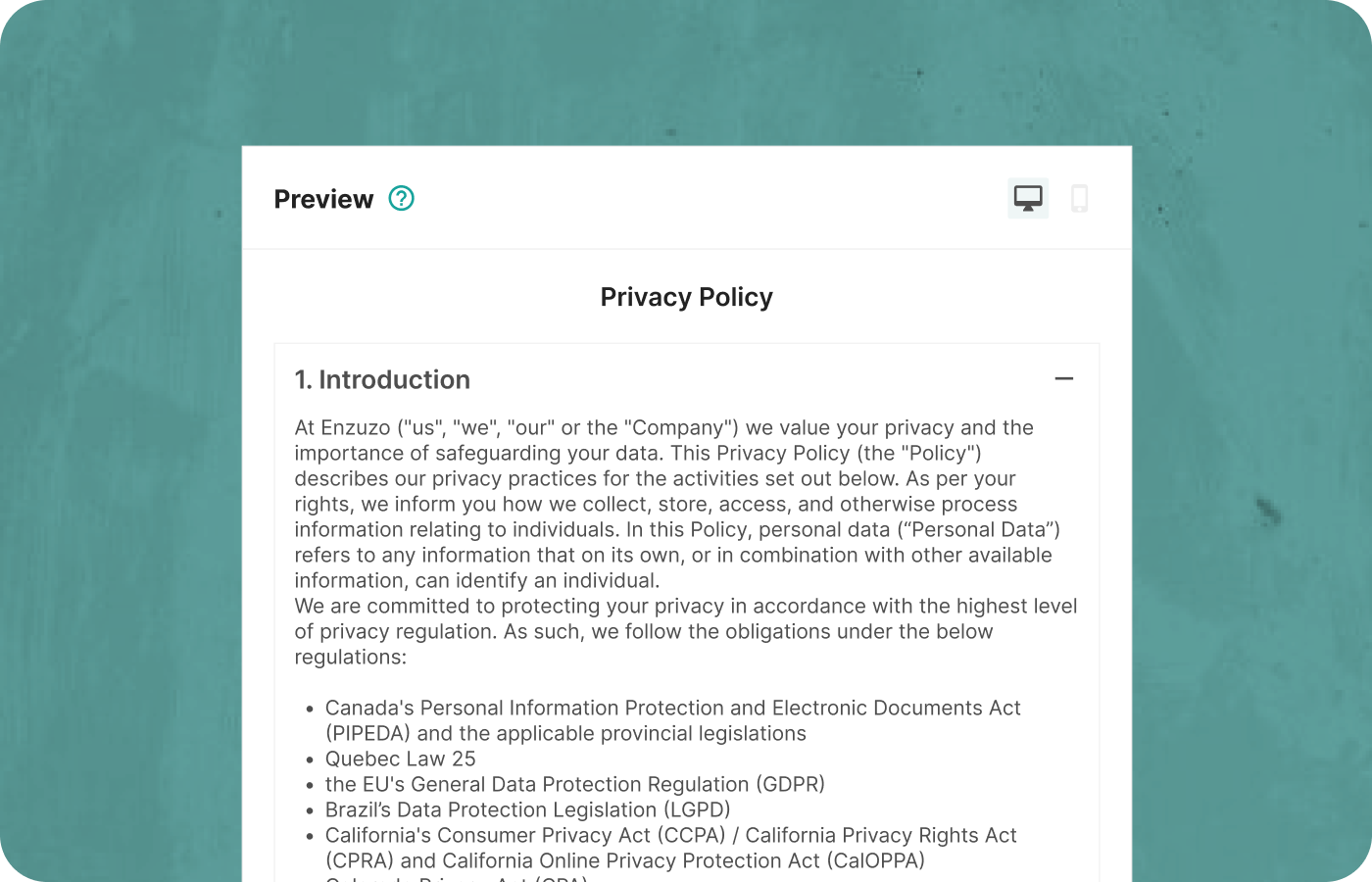
Step 3: Click generate
Once we have all the qualifying details, we’ll generate a custom privacy policy tailored to your business.
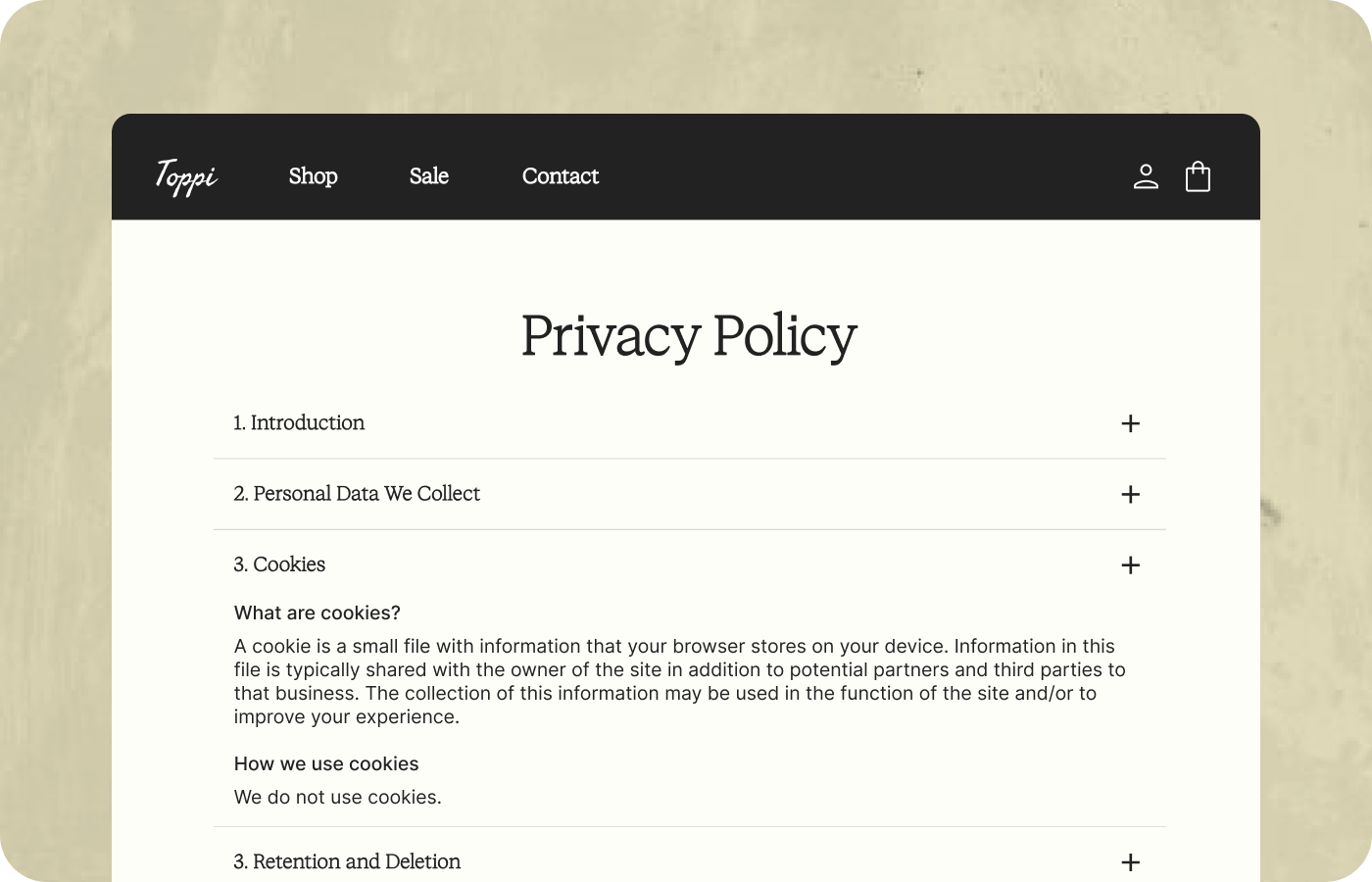
Step 4: Add the privacy policy to your website
Embedding the privacy policy is as simple as adding a couple of lines of Javascript on your website. Prefer a cut and paste option? We offer that too. All privacy policies can be hosted on a CMS of your choice.
Privacy policy generator features
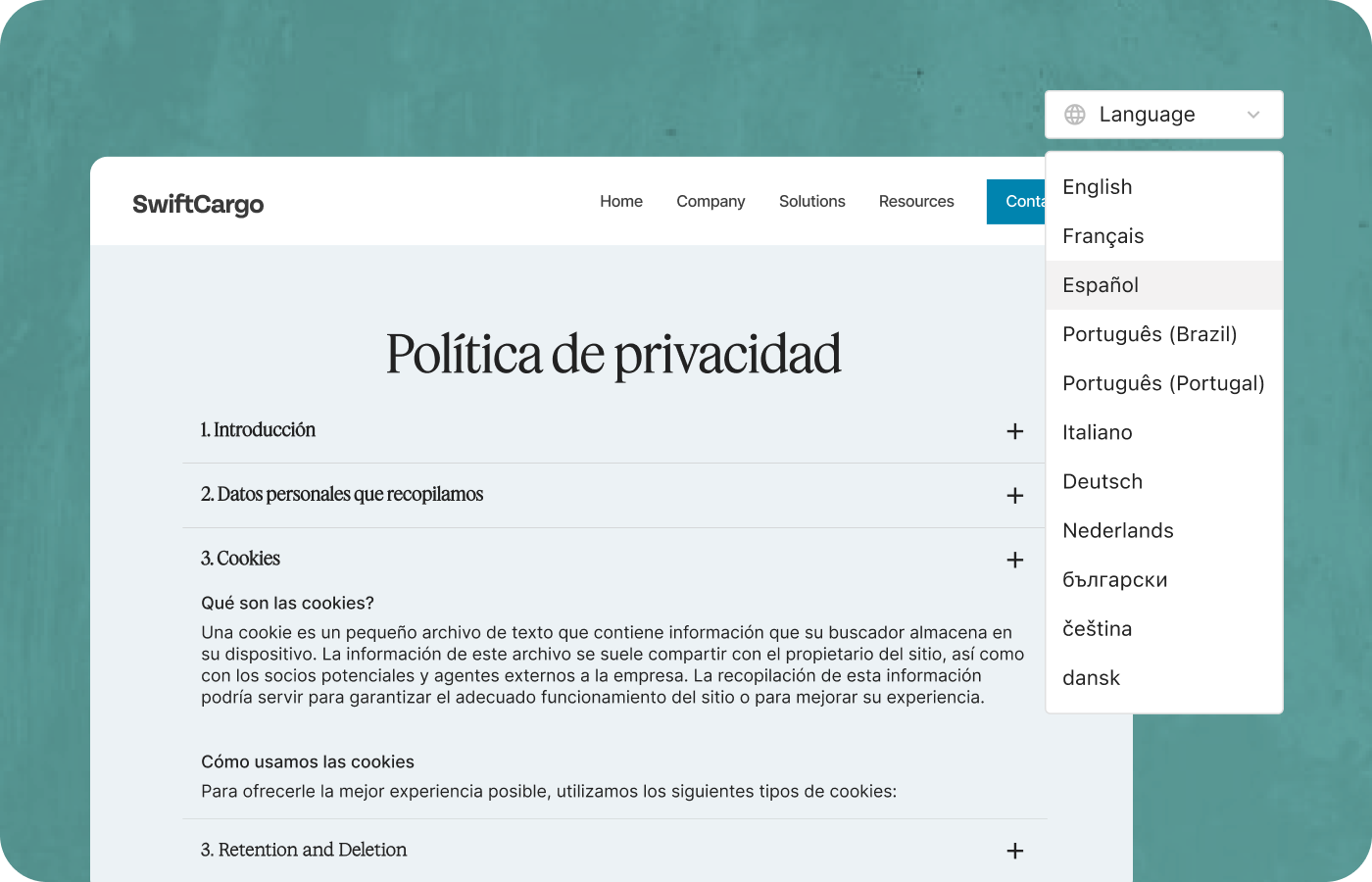
Automatic updates & global translations supported
Building a free privacy policy with Enzuzo means you never have to worry about changing laws and regulations. We review and update policies as needed and give you the option of translating them in 25 languages.
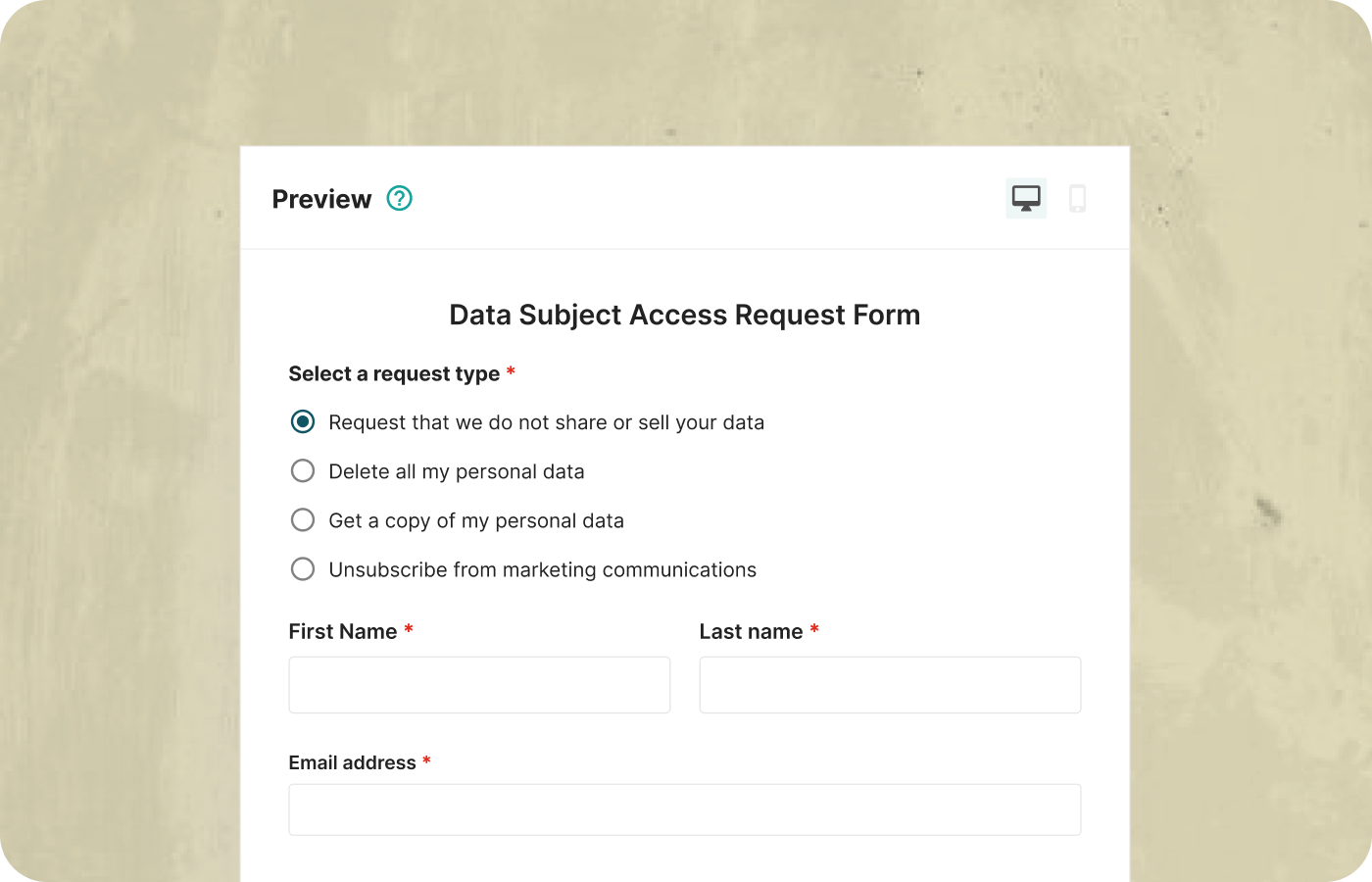
Build-in data access request forms (DSARs)
The GDPR, CCPA, and Quebec Law 25 mandate that businesses allow their customers to access, modify, or delete their data. We include this option directly inside your privacy policy.
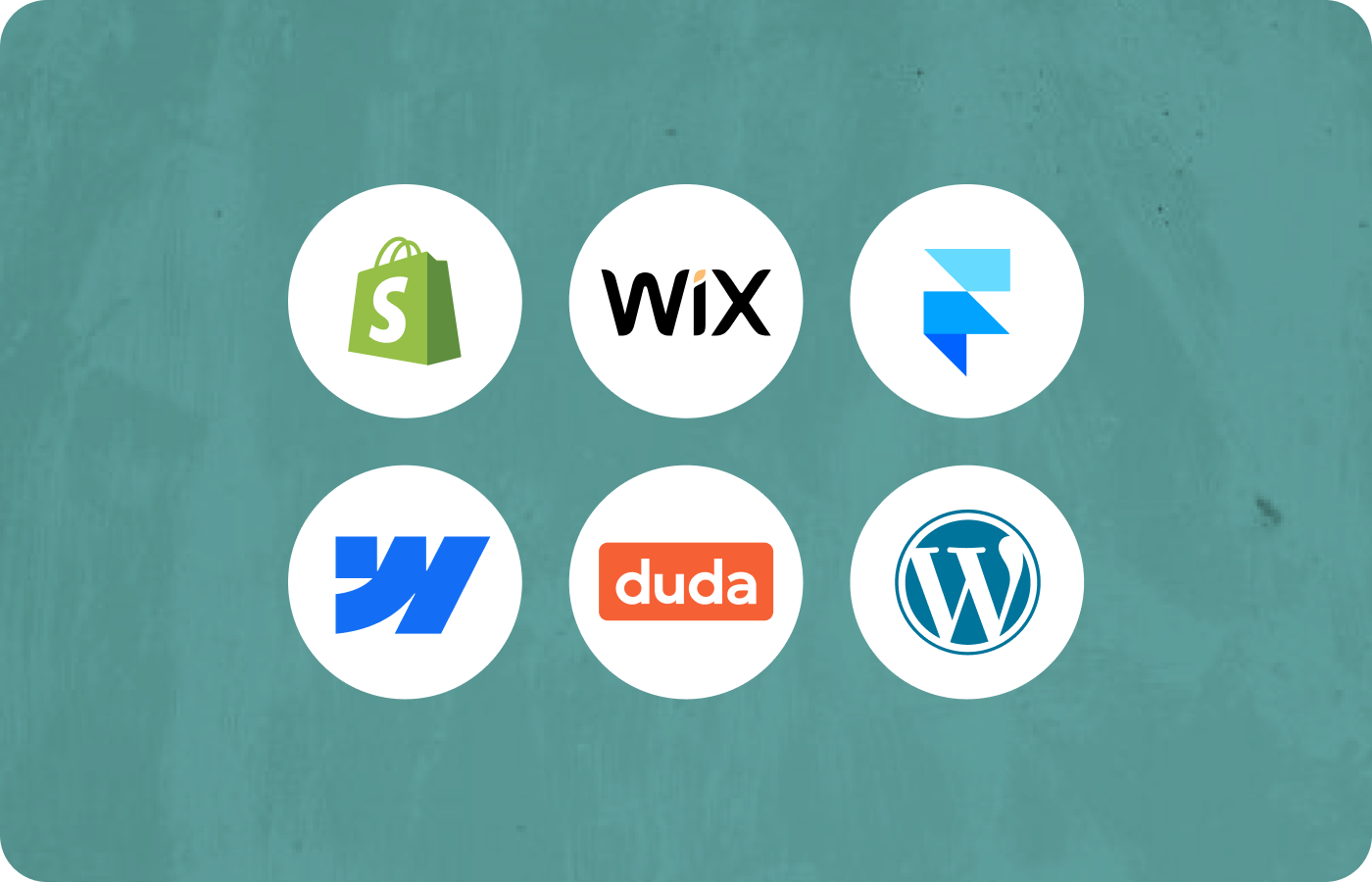
Support for all major platforms
Whether you run on Wordpress, Wix, Shopify, Duda, Webflow or a headless CMS, we have you covered. Our friendly customer support team is on hand to resolve any technical concerns.
Your Privacy Policy is needed for:
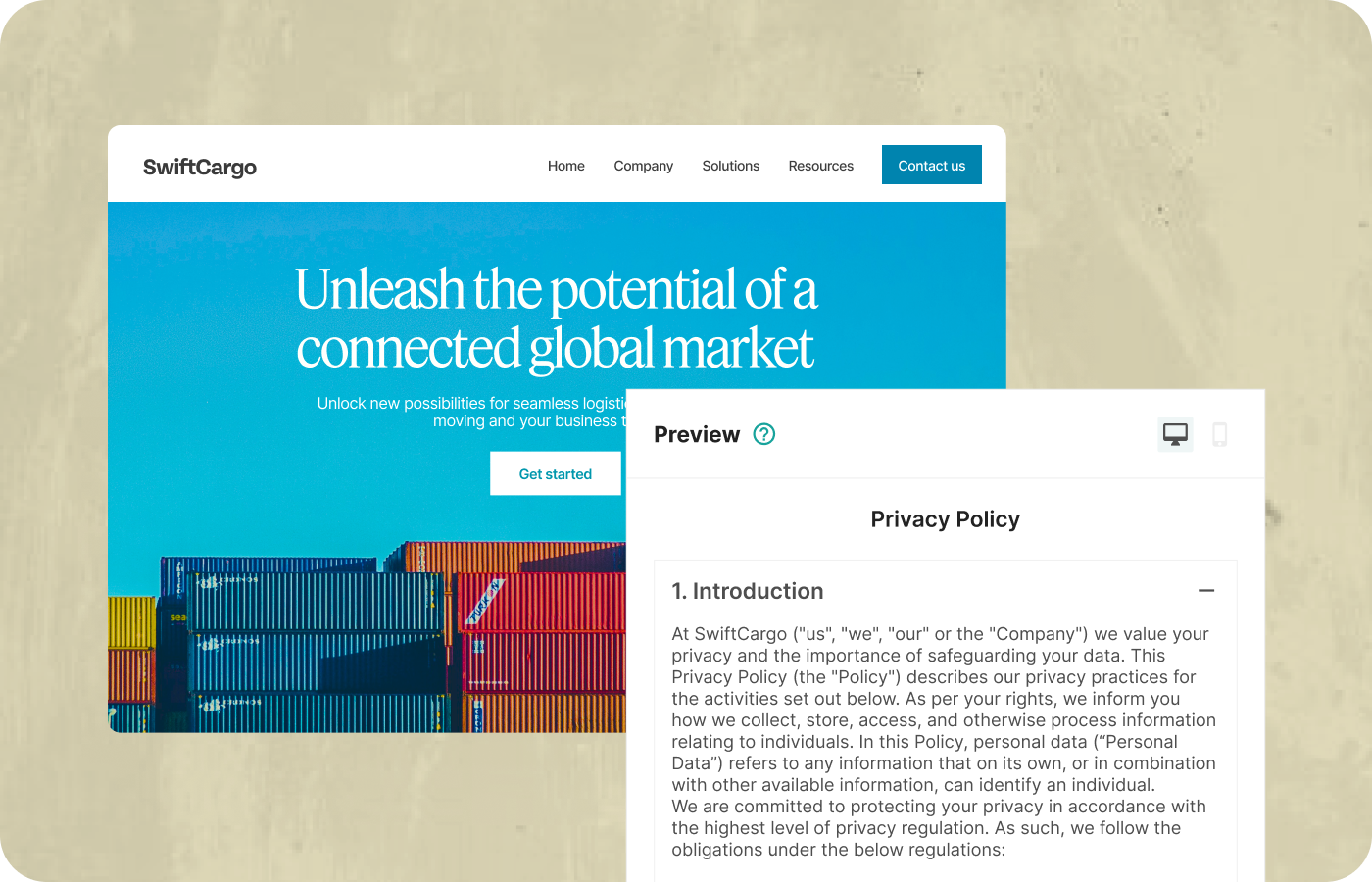
Privacy policy for blogs and websites
If you collect email addresses, send newsletters, or have contact forms on your blog, you require a privacy policy.
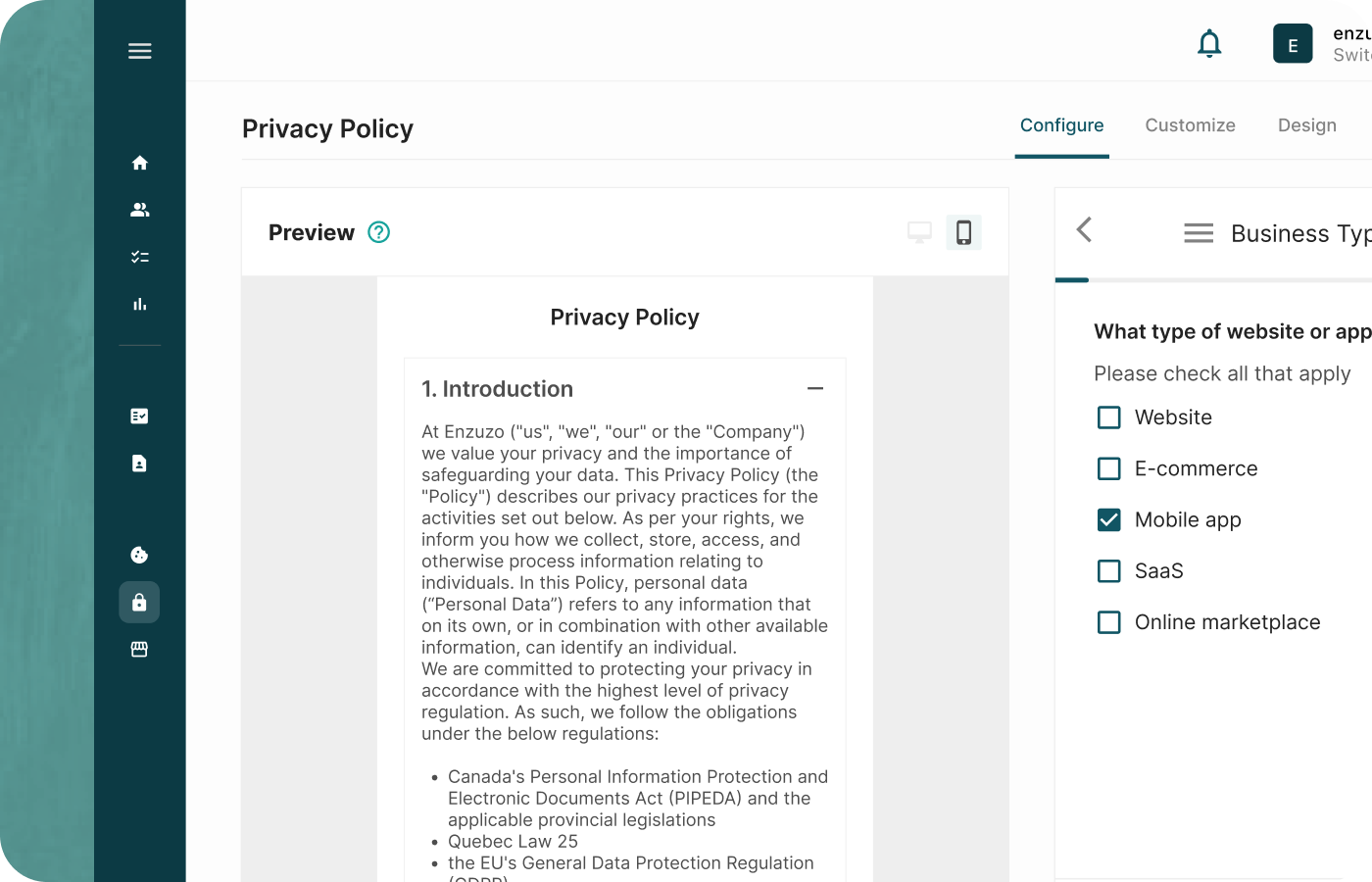
Privacy policy for mobile apps
The Google Play store and iOS app store both require your app to have a privacy policy. Avoid any untoward app suspensions and comply with guidelines.
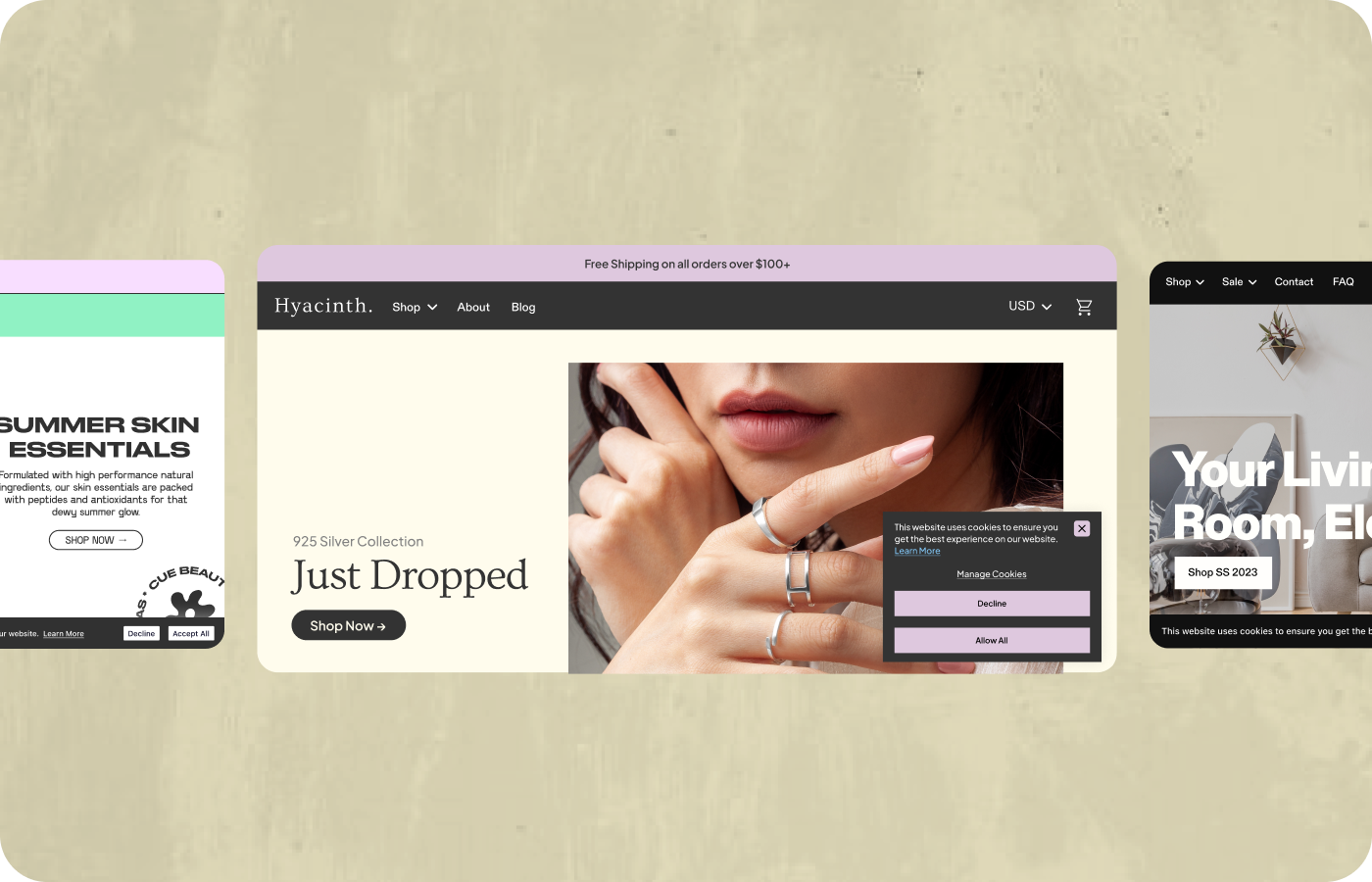
Privacy policy for E-commerce stores
Ecommerce stores collect a lot of personal information, including names, email addresses, shipping addresses, and more. Generate a compliant privacy policy for your store.
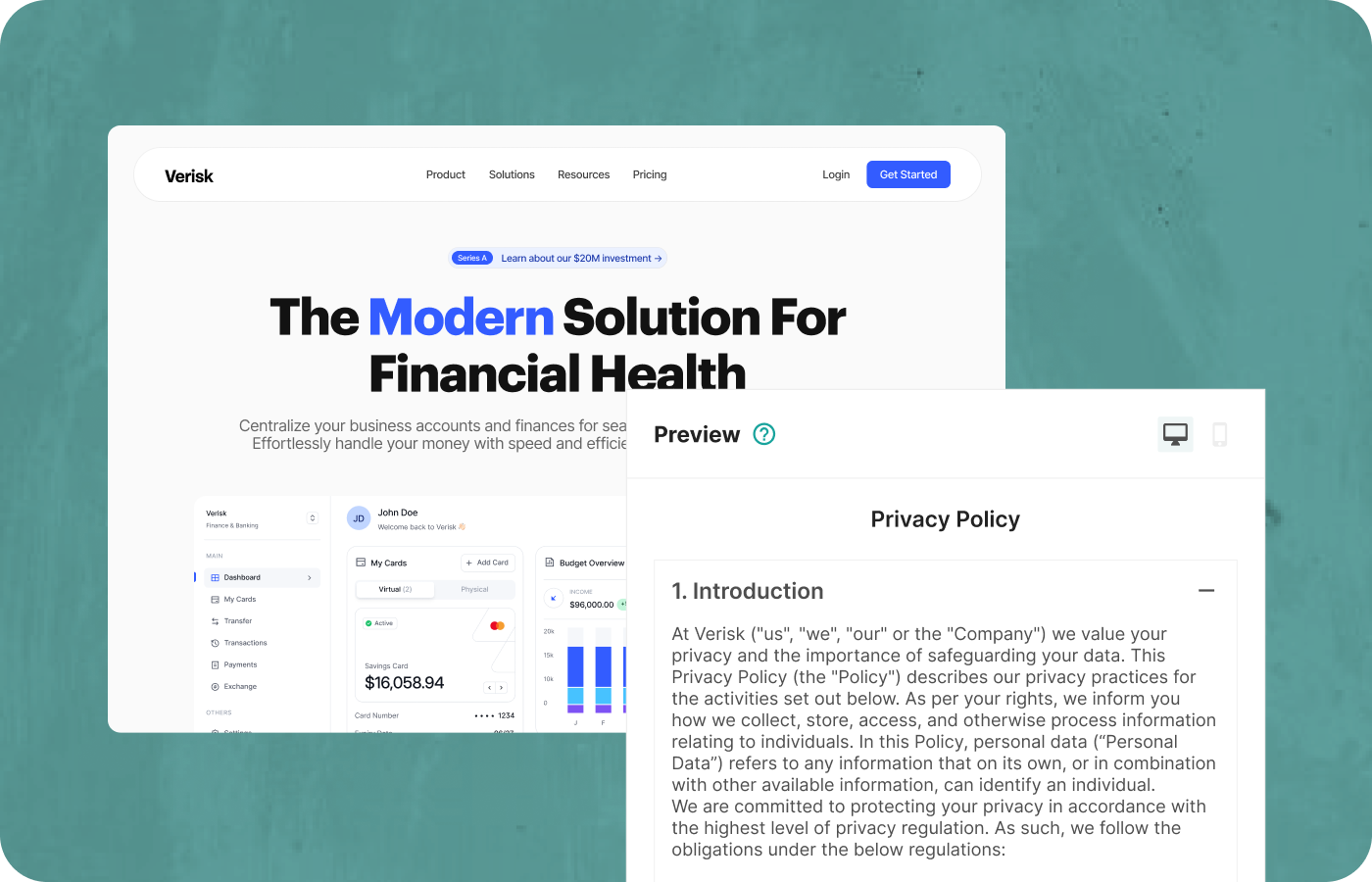
Privacy policy for SaaS
Generate a privacy policy for your web app that keeps customers informed of their rights and the information you collect.
Discover a privacy policy generator for your website platform
Looking for a privacy policy generator tailored to your CMS of choice? Check out our list below.
Privacy policy generator FAQs
Is Enzuzo's privacy policy generator free to use?
Yes. Enzuzo has a free forever plan for businesses just starting out and looking to add standard privacy features to their website.
What's more, the policy generator has all the features you need to collect information legally and use third-party tools safely and securely.
We also have affordable pricing plans with added features for small, medium, and fast-growing businesses that need a more comprehensive privacy solution.
What languages can I generate a privacy policy in?
Enzuzo's website privacy policy generator is available in 25+ languages: English, French, German, Italian, EU Portuguese, Brazilian Portuguese, Spanish, Dutch, and more!
We will be adding more languages to our privacy policy generator in the near future, so please stay tuned for additional information.
Is the privacy policy GDPR compliant?
Enzuzo's privacy policy generator covers all major data privacy laws, including General Data Protection Regulation (GDPR), Personal Information Protection and Electronic Documents Act (PIPEDA), California Consumer Privacy Act (CCPA), and Brazilian General Data Protection Law (LGPD). As more privacy laws are introduced, we will update your store privacy policy to comply with worldwide legal regulations.
Can I use a privacy policy template instead?
There's no harm in using a privacy policy template. However, you will have to customize it heavily to meet the requirements of your business.
We suggest that you use a privacy policy generator instead.
Enzuzo's privacy policies update as we detect changes in relevant laws, so it's a risk-free option.
How do I create a privacy policy for my business?
The easiest and best way to create a privacy policy for your business is to use Enzuzo's privacy policy generator. When you sign up, we'll ask you a few basic questions about your business, the countries where your customers are located, and how you collect data. After that, we'll create a legally-compliant privacy policy that's customized and relevant to your organization.
Do I need a privacy policy for my business if I don’t collect data?
Short answer, yes. Even if you don’t collect personal data from individuals who visit your company’s website, it is still good practice to draft and publish a privacy policy on your site regardless.
Publishing a privacy policy will save you time, hassle, and unnecessary stress down the line if you ever begin to start collecting personal data for your business. A privacy policy will also help to boost your professional outlook and give visitors confidence in your brand, services, and products.
Your privacy policy doesn’t need to be lengthy or complicated like with businesses that profit from the collection of personal information. It should simply state that your company does not gather any personal data. Your store or blog privacy policy should also include a clear definition of what you mean by the term “personal data”, so you can clarify exactly what information you do and do not collect from your users.
How does the privacy policy generator work?
Enzuzo's privacy policy generator is very easy to get started with. All you need to do is:
- Answer a few questions about your business using our built-in questionnaire
- Customize the style and look of your privacy policy
- Use our generated link to add the privacy policy to your website footer
Can I make changes to the privacy policy?
Absolutely! All of Enzuzo's privacy policies auto-update when we detect changes to data privacy laws but you can go inside your dashboard and update whatever sections you prefer.
Can I write my own privacy policy?
If you would rather write your own privacy policy, that's certainly a possibility. Our guide to writing a legally compliant privacy policy is a great place to get started since it lists the process step-by-step.
However, if you're not the best at complex legal terms and conditions, we suggest that you use our privacy policy generator instead.
What are the important considerations of a privacy policy?
Before generating a privacy policy, make sure to take into account things like:
- The data privacy laws that apply to your business
- The types and categories of personal information your product or service collects
- Your legal basis for collecting it and why you do it
- Whether you share the information with third parties
- Who in your organization has the information you collect from users
- The rights of your users and how they can request changes to their data
Can you copy a privacy policy?
We strongly advise against copying a privacy policy as it will hurt you in the long run.
Every business is different and has its own operating procedures. When you copy a privacy policy, you run the risk of adding items that are non-applicable to your business.
What's the difference between a privacy policy and cookie policy?
The terms appear to be similar but are different. A privacy policy highlights how you handle personal information such as names, phone numbers, credit cards, and mailing addresses.
A cookie policy discusses whether your users consent to track cookies — the tiny piece of code stored locally in your browser.
Is the privacy policy generator vetted by lawyers?
Yes! All of Enzuzo's legal policies have been vetted by an expert in-house legal team. So when you generate a privacy policy, rest assured that it has met high standards of data compliance.
I want to create my own privacy policy. How do I do that?
Great question. It's certainly possible to create your own privacy policy. Yes, there's some legalese in there that you have to be aware of, but following these instructions will point you in the right direction.
1. Your first option is to follow a step-by-step guide to writing your privacy policy. Here's where you need to go for that: Here.
2. Second, you could use a privacy policy template. Just open the template and fill out a few blank sections that have your business details Here's the template in Google Docs (you can download it in Microsoft Word and PDF formats too): Here.
3. Lastly, we recommend that you read privacy policy examples from across the internet too. These will give you inspiration and can become your privacy policy swipe file.
Can I use this to generate a free privacy policy for an online store?
Absolutely. Enzuzo's privacy policy generator is customizable for a range of business requirements, including online stores. And as stated above, it's totally free to set up and install.
Is your tool a free GDPR privacy policy generator?
You bet! All privacy policies generated are GDPR compliant. We collaborated with expert human lawyers to make sure that each privacy policy is an ironclad promise to your audience.
Do you support generating a free privacy policy for apps?
Yes, our privacy policy generator is able to whip up a compliant policy for your mobile app. When you sign up, we'll ask you a few questions relevant to your business. Just select 'mobile app' and we'll get to building one that takes care of the rest.
What about a free privacy policy generator for SaaS? Can you support one?
For sure. If you're looking to build a privacy policy generator for SaaS, we can certainly assist. Just head over to our sign up page, follow our easy step-by-step instructions, and you'll have a compliant privacy policy in no time.
Can I generate a free privacy policy for Facebook?
Whether you're running Facebook lead ads or building a new Facebook page, Enzuzo's privacy policy generator can help keep you legally compliant across all countries.
Is this a Google privacy policy generator?
Google prioritizes websites with excellent user experience, and a privacy policy is certainly part of that. Our post about how privacy policy helps SEO highlights this in more detail.
Use Enzuzo's privacy policy generator to build a privacy policy that satisfies search engine requirements, and watch your rankings and conversions improve.
Can I use your tool to generate a free privacy policy for my blog?
Blogs and niche websites are one of our most popular use cases. We encourage you to generate a free privacy policy for your blog using Enzuzo's tool and follow our simple step-by-step process to make it live on your preferred platform (such as Wordpress).
I'm looking for a legal pages generator. Can you help?
Absolutely! We support many legal pages. A privacy policy is certainly an essential legal page, but it's not the only one. Enzuzo can also help you build:
- Terms of Service
- Cookie Banners
- Returns & Refund Policies
- End User License Agreements
- Data Subject Access Request Forms
What about a CalOPPA privacy policy generator? Does your tool support it?
We are 100% compliant with all U.S. federal privacy laws, including the California Online Privacy Protection Act (CalOPPA).
Generate a privacy policy with confidence, reassured that Enzuzo has your back.
Still have questions about Enzuzo? Visit the Help Center.



